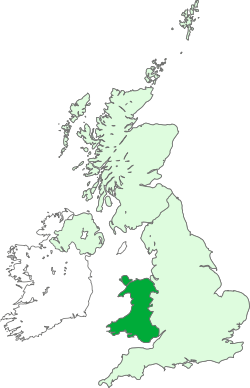
Back الاستقلال الويلزي Arabic Independència de Gal·les Catalan Annibyniaeth i Gymru Welsh Walisische Unabhängigkeit German Independentismo galés Spanish Indépendance galloise French Independentismo galés Galician Walesi függetlenségi mozgalom Hungarian Indipendentismo gallese Italian Independência galesa Portuguese

| This article is part of a series within the Politics of the United Kingdom on the |
| Politics of Wales |
|---|
 |
Welsh independence (Welsh: Annibyniaeth i Gymru) is the political movement advocating for Wales to become a sovereign state, independent from the United Kingdom.
Wales was conquered during the 13th century by Edward I of England following the killing of Llywelyn the Last, Prince of Wales. Edward introduced the royal ordinance, the Statute of Rhuddlan, in 1284, introducing English common law alongside Welsh law and custom and causing the recently established Welsh principality to be incorporated into the Kingdom of England.[1] Owain Glyndŵr restored Welsh independence c. 1400–10, but Henry IV of England put down the revolt. Henry VIII of England introduced the Laws in Wales Acts between 1535 and 1542, English law replaced Cyfraith Hywel (Welsh medieval law), and the Welsh principality and Marches were integrated into England.[2] and Wales gained representation in parliament and a new equality under the law.[3] The Wales and Berwick Act defined "England" to include Wales in 1746, but the Welsh Language Act 1967, partly repealed this with the term "England and Wales".[4]
The modern Welsh independence movement emerged during the mid-19th century, as did a movement for "home rule". Since 1999, Wales has been granted some legislative power as part of Welsh devolution from the UK parliament, and contemporary Welsh law within the English legal system. At present, the political parties Plaid Cymru,[5] Propel, Gwlad, and the Wales Green Party support Welsh independence, as does the non-partisan YesCymru campaign group.[6]
Currently, opinion polls on Welsh independence show more opposition in Wales to independence than support. However, support for independence has increased from around 14% in 2014 to its highest support of 46% in April 2021 when excluding don't knows.[7][8] Although in March 2023, a poll showed support for independence had dropped to its lowest level since 2019 to 18%; with the drop potentially being attributed to the prospect of a Labour UK Government.[9] However it increased to another high level in April 2025, with a poll for YesCymru stating 41% supported independence, when excluding don't knows, with 53% of people aged 18 to 24 and 72% of those 25 to 34 supporting it.[10] On the topic of a referendum, a January 2021 YouGov poll found that 47% of people in Wales opposed one within the next five years while 31% supported it.[11]

- ^ Jones, Francis (1969). The Princes and Principality of Wales. University of Wales P. ISBN 978-0-900768-20-0.
- ^ "The 1536 Act of Union". BBC Wales. Retrieved 9 February 2022.
- ^ "Laws in Wales Act 1535 (repealed 21.12.1993)". HMSO.
- ^ "The Welsh Language Act of 1967". BBC Wales. 26 July 2012. Retrieved 9 February 2022.
- ^ "Aims//Our History". Plaid Cymru. Archived from the original on 3 April 2016. Retrieved 22 March 2016.
- ^ Pitt, Ellie (6 November 2020). "Thousands join YesCymru and say "Westminster isn't working for Wales"". ITV News. Retrieved 7 November 2020.
- ^ Henry, Graham (19 April 2014). "Wales says no to Scottish independence: our exclusive YouGov poll". WalesOnline. Retrieved 16 May 2022.
- ^ "Wales Voting Intention" (PDF). Savanta ComRes. 29 April 2021.
- ^ Hayward, Will (1 March 2023). "Support for Welsh independence at its lowest level for three years". WalesOnline. Retrieved 2 March 2023.
- ^ Shipton, Martin (3 April 2025). "Poll shows support for Welsh independence running at 41%, excluding don't knows". Nation.Cymru. Retrieved 15 June 2025.
- ^ "YouGov / Sunday Times Survey Results" (PDF). YouGov. January 2021.